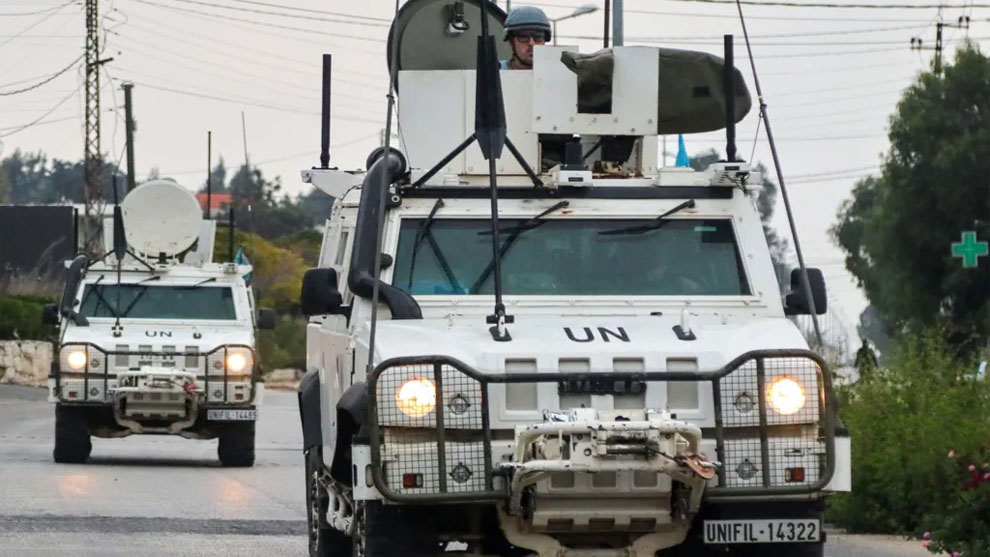International
US to Israel: Stop shooting at UN peacekeepers in Lebanon

US to Israel: Stop shooting at UN peacekeepers in Lebanon
US President Joe Biden has said he is “absolutely, positively” urging Israel to stop firing at UN peacekeepers during its conflict with Hezbollah in Lebanon, following two incidents in 48 hours.
On Friday, the Israel Defense Forces (IDF) said its troops were responsible for the incident, in which two Sri Lankan soldiers for the UN Interim Force in Lebanon (Unifil) were injured.
IDF soldiers operating around the Unifil base in Naqoura identified a threat and opened fire, the Israeli army said, adding the incident would be investigated “at the highest levels”.
On Thursday, Unfil’s two Indonesian soldiers were injured falling from an observation tower after an Israeli tank fired towards it.
The leaders of France, Italy and Spain issued a joint statement condemning Israel’s actions, saying they were unjustifiable and should immediately come to an end.
Sri Lanka’s foreign ministry said it “strongly condemns” the IDF attack which injured two of its soldiers.
The head of UN peacekeeping said there was reason to believe some firing on UN positions in southern Lebanon had been direct, though he did not ascribe responsibility for the incidents.
“For example we have a case where a tower was hit by a fire and also damages to cameras at one of the positions – which obviously to us very much looked like direct fire,” Jean-Pierre Lacroix told the BBC’s Newshour programme.
As Israel’s invasion of southern Lebanon continues, the IDF and the Lebanese armed group Hezbollah continued to fire missiles and rockets across the Israel-Lebanon border.
READ ALSO:
- Customs seize smuggled fuel, sell at N630/ litre
- Lebanon calls for UN decision on ceasefire as Israeli strikes expand
- Tinubu, Remi and Akpabio mocking Nigerians’ hardship, By Farooq Kperogi
The IDF said it had detected about 100 rockets crossing into northern Israel from Lebanon within the space of half an hour on Friday. Two unmanned aerial vehicles (UAVs) were detected crossing from Lebanon, one of which was intercepted, the IDF said.
The Lebanese ministry of health said three people, including a two-year-old girl, were killed in an Israeli raid on the city of Sidon in southern Lebanon. Two Lebanese soldiers were killed after Israeli forces targeted an army post in the town of Kafra in southern Lebanon, the Lebanese army said.
In the capital, Beirut, emergency workers continued to comb through the wreckage of buildings hit by two Israeli air strikes on Thursday.
Lebanese Prime Minister Najib Mikati said the attacks came with no warning and killed 22 people, all civilians, and injured another 117. Israel has not commented.
Israeli forces launched a ground invasion into southern Lebanon last month as they escalated their response to rocket fire from Hezbollah.
Hezbollah and Israel have been trading near-daily cross-border fire since last October, when the Palestinian armed group Hamas in the Gaza Strip carried out a deadly attack in southern Israel.
The IDF has said the UN post struck in Naqoura on Friday was about 164ft (50m) away from the source of the threat identified by soldiers. It said it had told peacekeeping troops to stay in protected spaces at the time.
Unifil said Israeli military vehicles had knocked over barriers at another UN site in Labbouneh, closer to the border with Israel.
The incidents represented a “serious development”, it said.
Mikati said Friday’s attack was “a crime which is directed at the international community”.
Israel argues that Unifil has failed to stabilise the region, and has asked peacekeepers to withdraw northwards so it can confront Hezbollah.
READ ALSO:
- NNPCL boss Mele Kyari loses daughter, Shettima sends condolences
- Libya frustrated us, one-goal victory a relief – S’Eagles Coach Eguavoen
- Chisco Transport deploys new buses, plans expansion, reward for travellers
The Israeli ambassador to the UN, Danny Danon, has reiterated Israel’s call for Unifil personnel to withdraw north by 5km (3 miles) to “avoid danger,” but the UN’s Jean-Pierre Lacroix said they would remain in position.
About 10,000 peacekeepers from 50 countries are stationed in Lebanon, alongside around 800 civilian staff.
Since 1978, they have patrolled the area between the Litani River and the UN-recognised boundary between Lebanon and Israel, known as the “Blue Line”.
Hezbollah began firing rockets into northern Israel on 8 October last year, the day after Hamas’s deadly attack on southern Israel. The Iran-backed group says it is acting in solidarity with the Palestinians and has said it will stop firing if there is a ceasefire between Israel and Hamas in Gaza.
Over the past three weeks, Israel has dramatically escalated its campaign against Hezbollah, intensifying air strikes against southern Lebanon and southern parts of Beirut, assassinating Hezbollah’s leader Hassan Nasrallah and launching a ground invasion.
Lebanon says more than 2,000 people have been killed, mainly in the recent escalation, and hundreds of thousands have been displaced. This week Hezbollah rocket fire has killed two Israeli civilians and a Thai national, Israeli authorities say.
In a separate development on Friday, Gaza’s Hamas-run civil defence agency was quoted by the AFP news agency as saying at least 30 people were killed in Israeli strikes in the Jabalia town and refugee camp in the north of the Palestinian enclave.
The IDF has not commented on the issue.
Meanwhile, the medical charity Doctors Without Borders (MSF) said “thousands are trapped” in the Jabalia refugee camp, including five of its staff.
The MSF said Israeli forces had issued evacuation orders on 7 October in Jabalia, “while carrying out attacks at the same time”, meaning people could not leave safely.
Dr Mohammed Salha, the acting director of the al-Awda Hospital in Jabalia, told the BBC’s Newshour programme the area had been under siege for seven days.
He warned that the hospital would run out of fuel on Saturday, as Israeli forces were “cutting Jabalia from the rest of Gaza”.
“No medication, no medical supplies, no healthy water, no fuel, so pressure, pressure on these people to move and go directly to the south,” Dr Salha said.
Israel has been conducting a new ground operation in the area, saying it is targeting regrouping Hamas fighters who aim to launch attacks, with dozens of people reportedly killed or wounded in northern Gaza in recent days.
US to Israel: Stop shooting at UN peacekeepers in Lebanon
BBC
International
Thousands pay tributes as Pope Francis’ body lies in state at St. Peter’s Basilica

Thousands pay tributes as Pope Francis’ body lies in state at St. Peter’s Basilica
Vatican City was filled with the sounds of bells and heartfelt chants on Wednesday morning, as thousands of mourners gathered to honor the late Pope Francis.
In a moving and solemn procession, his simple wooden coffin was carried through St. Peter’s Square, marking the beginning of final rites for the beloved pontiff.
The procession began at the Domus Sancta Marta, the residence where Pope Francis passed away, and continued toward St. Peter’s Basilica. There, his body will lie in state until his funeral, scheduled for Saturday.
Two long lines of cardinals and Vatican officials escorted the coffin, while faithful from around the world looked on in prayer and reverence.
Dressed in a red chasuble and a white miter, with a rosary gently wrapped around his fingers, Pope Francis was honored with continuous applause as Swiss Guards solemnly accompanied the casket through the square.
Teresa Piuvano, a New Jersey resident who has been in Rome since March volunteering at Vatican events for the Jubilee year, saw Francis’ appearances on Palm Sunday and Easter Sunday. Easter, she said, “was the most special. I think he wanted to do that to say goodbye to the people because he rode around the whole square even though he was very ill.”
Inside the basilica, the pope was laid on a simple podium instead of the wooden structure, called a catafalque that has traditionally held a pope’s coffin as he lies in state. The ceremony that concluded the procession, led by Cardinal Kevin Farrell, who as camerlengo is charged with overseeing the logistics of the pope’s funeral, referred to Francis in humble terms such as “bishop” and “pastor.”
READ ALSO:
- Rivers: Tinubu set to emergency rule after meeting Fubara
- NNPCL: Protesters storm AGF office, demand probe of Mele Kyari
- Fresh herders’ attack claims 11 lives in Benue
“Dearest brothers and sisters, with great emotion we accompany the mortal remains of our Pope Francis into the Vatican basilica where he often exercised his ministry as the bishop of the church that is in Rome and as pastor of the universal church,” Farrell said in the prayer service.
After the death of Pope Emeritus Benedict XVI, Francis changed the protocol for papal funerals to streamline and simplify the procedures. The pope wanted his own funeral to reflect the life of a pastor and not of a powerful king or politician, he said in interviews.
After the ceremony, cardinals proceeded to bow one by one in front of the coffin before the mourners lined up in the square were admitted.
Nearly 20,000 people visited the basilica yesterday, according to the Vatican, which added that it would ensure that all who wish to pay their final respects to the pope have a chance by staying open after midnight if necessary.
Second General Congregation of Cardinals held in the Vatican
The second General Congregation of Cardinals began yesterday afternoon in the Synod Hall at about 5:00 PM, and ended at 6:30 PM.
According to the Holy See Press Office, 103 cardinals were present. They began the meeting with the ‘Veni, Sancte Spiritus’ prayer, and then with a prayer in suffrage of Pope Francis.
The Cardinals who were not present at Tuesday’s General Congregation were sworn in.
The programme of the Novemdiales, the ancient nine-day period of mourning for the Pope, was approved.
The next General Congregation will be today at 9:00 AM.
At the first General Congregation, held on Tuesday morning, the Cardinals decided to suspend all scheduled beatifications until the new Pope can approve them.
Moreover, in accordance with the norms of Universi Dominici Gregis, a commission of three Cardinals was selected by lot to assist the Camerlengo in the governance of the Church during the sede vacante.
These three Cardinals represent the three orders of the College of Cardinals and are replaced every three days. The first group of three Cardinals chosen was Pietro Parolin (episcopal order), Stanisław Ryłko (presbyteral order), and Fabio Baggio (diaconal order).
The Holy See Press Office noted that around 20,000 people had paid their respects to the late Pope Francis as of 7:30 PM on Wednesday evening.
Why King Charles isn’t allowed at pope’s funeral
Prince William will be traveling to the Vatican to attend the funeral of Pope Francis on behalf of the British royal family later this week. And if you’re wondering why King Charles isn’t going, he literally isn’t allowed.
Royal expert Katie Nicholl writes in Vanity Fair that King Charles “will not travel to the Vatican, in accordance with protocol and precedence which dictates that the Sovereign does not attend funerals, Buckingham Palace has confirmed.” And FYI, this isn’t the first time an heir has attended the funeral of a pope on behalf of the sovereign—back in 2005, then-Prince Charles attended Pope John Paul II’s funeral instead of Queen Elizabeth.
That said, King Charles did visit the pope just a few days before his recent passing, and he released a statement after his death.
Thousands pay tributes as Pope Francis’ body lies in state at St. Peter’s Basilica
International
UK records over 22,000 asylum-seeking Nigerians

UK records over 22,000 asylum-seeking Nigerians
The United Kingdom Home Office received 22,619 asylum petitions from Nigerian nationals between 2010 and 2024.
Nigerians accounted for one in every 30 UK asylum claims over the time, ranking 11th in the Home Office’s recently released year-end asylum and resettlement figures.
According to the Home Office, over two times as many Nigerians (2,841) requested asylum in 2024 than in 2023 (1,462).
Overall, 108,138 people applied for asylum in the UK in 2024, representing a 378 per cent increase from 2010. The majority were first-time claims by South Asian and Middle Eastern nationals.
Iran topped the chart with 75,737, perhaps pushed by the rising persecution of dissidents by the Iranian regime.
Pakistan trailed far behind with 57,621. In 2024, 10,542 Pakistanis sought asylum in the UK, prompted by post-election upheaval, rising inflation, and an increase in blasphemy cases, which human rights groups argue provide strong grounds for protection claims.
Afghanistan has received 54,363 asylum petitions since 2010. In 2024, 8,508 Afghans sought sanctuary in the United Kingdom, a development that experts suggest is a continuation of the Taliban’s ouster of the Karzai administration in 2022.
That year, 11,358 Afghans applied for asylum in the United Kingdom, with 9,710 applications the following year.
Others include Albania (50,944), Iraq (45,711), Eritrea (37,687), Syria (34,997), and Bangladesh (31,744). Asylum seekers from Bangladesh increased from 5,097 in 2023 to 7,225 in 2024. The rise corresponded with the removal of previous Prime Minister Sheikh Hasina.
READ ALSO:
- Driver crushes one-year old boy to death in Ekiti
- Bring your children to compete with mine, MC Oluomo challenges those mocking his spoken English
- Insecurity: Presidency questions push for state police, accuses govs of not doing much
Sudan and India complete the top ten, with 30,897 and 30,179, respectively.
Nigeria’s 22,619 filings are just ahead of Sri Lanka’s 22,059 and surpass Vietnam, China, and Turkey. Brazil, Kuwait, Yemen, Colombia, and Jordan were at the bottom of the list, with each providing fewer than 6,500 claims.
Analysts attribute Nigeria’s rise on the list to tough conditions such as insecurity, bandit assaults, abduction, and a collapse in household purchasing power following the naira’s devaluation in 2023.
In a conversation with our correspondent, Charles Onunaiju, Research Director, Centre for China Studies, Abuja, stated, “We face a difficulty. Nigeria is becoming unfriendly, particularly for young people with limited opportunities, and there is a desperate desire to travel overseas.
According to local reports, young professionals who previously entered the UK on skilled worker visas are increasingly hedging their bets by applying for asylum once there; others arrive irregularly via continental Europe, citing kidnapping threats and communal attacks in their affidavits.
According to the reports, in most cases, petitioners also claim political persecution under Nigeria’s wide cybercrime legislation or discrimination based on sexual orientation—both of which are protected under the Refugee Convention.
According to the Home Office’s website, an asylum seeker must demonstrate a “well-founded fear of persecution” because of their race, religion, nationality, political opinion, or membership in a certain social group.
The Home Office determines the initial decisions, and negative rulings can be challenged in the Immigration and Asylum Chamber.
In theory, the Illegal Migration Act of 2023 makes people who travel through a safe third nation inadmissible.
However, the UK government’s proposed removal process, particularly its contract with former Prime Minister Rishi Sunak to transfer claimants to Rwanda, is still enmeshed in legal obstacles.
As a result, the majority of 2024 and 2025 arrivals will continue to use the existing system.
Dr Aliyu Ilias, an Abuja-based development economist, told The PUNCH that as more Nigerians leave and stay permanently overseas, the country will have less trained labour.
He stated that with most Nigerians confronting both economic headwinds and deteriorating security at home, the British asylum route, however uncertain, still appears to offer a better prospect.
Ilias explained, “It’s definitely a cause of concern because this includes our professionals who are moving, and it takes a whole lot to train these professionals.
“In the medical sector, Nigeria subsidises a lot to get people trained. You cannot get trained as a medical doctor or an engineer abroad for a cheaper cost compared to what we get in Nigeria.
“So, it is total brain drain in the long run, and for the economy, it is reducing our GDP. The appalling part is that most of our Nigerian brothers and sisters who go out do not return. They get permanent residency, and they become valuable to the immediate country.”
UK records over 22,000 asylum-seeking Nigerians
International
Harvard University sues Trump over funding cuts

Harvard University sues Trump over funding cuts
Harvard sued US President Donald Trump’s administration Monday in a sharp escalation of the fight between the prestigious university and the Republican, who has threatened its funding and sought to impose outside political supervision.
Trump has sought to bring several prestigious universities to heel over claims they tolerated campus anti-Semitism, threatening their budgets, tax-exempt status and the enrolment of foreign students, but Harvard has refused to bow.
“This case involves the Government’s efforts to use the withholding of federal funding as leverage to gain control of academic decision making at Harvard,” the Ivy League university said in a lawsuit filed in a Massachusetts federal court that named several other institutions targeted by Trump.
“The Government’s actions flout not just the First Amendment, but also federal laws and regulations,” said the complaint, which called Trump’s actions “arbitrary and capricious.”
Trump is furious at Harvard for rejecting government supervision of its admissions, hiring practices and political slant and last week ordered the freezing of $2.2 billion in federal funding to the storied institution.
The lawsuit calls for the freezing of funds and conditions imposed on federal grants to be declared unlawful, as well as for the Trump administration to pay Harvard’s costs.
Trump and his White House team have publicly justified their campaign against universities as a reaction to what they say is uncontrolled “anti-Semitism” and a need to reverse diversity programs aimed at addressing historical oppression of minorities.
READ ALSO:
- NNPCL: Ojulari’s ambitious five-year $60bn investment agenda
- Osimhen to rake in N136bn from Man United
- U20 AFCON: Flying Eagles tackle Young Pharaohs in friendly
The administration claims protests against Israel’s war in Gaza that swept across US college campuses last year were rife with anti-Semitism.
Many US universities, including Harvard, cracked down on the protests over the allegations at the time, with the Cambridge-based institution placing 23 students on probation and denying degrees to 12 others, according to protest organizers.
“Harvard can no longer be considered even a decent place of learning, and should not be considered on any list of the World’s Great Universities or Colleges,” Trump said on his Truth Social platform last week.
“Harvard is a JOKE, teaches Hate and Stupidity, and should no longer receive Federal Funds.”
-

 metro2 days ago
metro2 days agoRivers: Tinubu meets with Fubara, may lift his suspension
-

 metro3 days ago
metro3 days agoBring your children to compete with mine, MC Oluomo challenges those mocking his spoken English
-

 metro2 days ago
metro2 days agoI’m not in supremacy battle with Ooni, says new Alaafin
-

 News3 days ago
News3 days agoTinubu returns to Nigeria after France, UK trip
-

 Business3 days ago
Business3 days agoMarketers count losses as NNPC slashes petrol price
-

 metro3 days ago
metro3 days agoRivers: Fubara’s supporters praise Tinubu’s intervention with emergency rule
-

 metro2 days ago
metro2 days agoBandits attack Kwara North, kill vigilante, six others
-

 Business2 days ago
Business2 days agoNigeria’s gas production increases by 15.6% to 227,931.65 mscf













